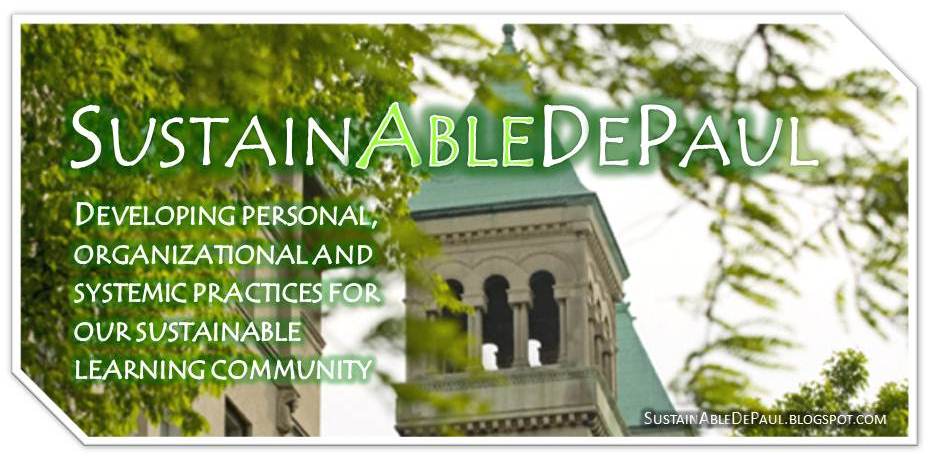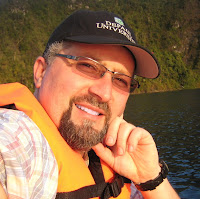
What Must Be Done? DePaul as Sustainable Learning Community
Extract from the White Paper on Sustainability at DePaul University
The Sustainability Initiatives Task Force Committee
August 31, 2009
St. Vincent’s vocation and therefore the Vincentian age emerged in January 1617 when Madame de Gondi turned to Vincent de Paul and asked “What must be done?” Often referred to as the Vincentian Question, it has shaped the Vincentian mission ever since. At various times and in various contexts over the last 350 years, the Vincentian family has faithfully been witness to the profound vision of its founders, Vincent de Paul and Louise de Marillac. Each effective response over the last few centuries, however, presupposed an accurate response to a prior question: “what is going on?” Reading and responding to the signs of the times, in other words, is what makes the Vincentian mission relevant for us today. In his times, Vincent’s vision allowed him to see the hidden poverty and suffering that so many refused to acknowledge. In response to the poverty he witnessed, Vincent created sustainable and institutionalized solutions to address it.
Today’s signs are even more ominous than the ones facing Vincent 350 years ago. Many recent commentators have noted that the world is now at a tipping point: every living system is declining and the rate of decline is accelerating as a growing human population continues to become more urban and more resource intensive. If the present trajectory continues unabated, many have argued, we will need 3 to 5 planets to sustain it. In short, we must leave behind an age of “domination and exploitation” and enter a new, rapidly developing age of sustainability.
Reading the signs of the times and effectively answering the Vincentian question
demands that we re-think our common calling to higher education. As Albert Einstein cautioned, “we can’t solve problems by using the same kind of thinking we used when
we created them.” In light of the challenges we face as human beings on a planet that is increasingly hot, flat, and crowded, we must revisit what it means to be an institution of higher education. Students exposed from a young age to concerns about social issues and the environment are looking for educational opportunities that will enable them to pursue meaningful careers to address them. As a leading educational institution in Chicago, DePaul has the opportunity to further implement its mission to educate members of all sectors of society in sustainable practices for our changing times. Living up to the motto it adopted in 1954, viam sapientiae monstrabo tibi, DePaul can truly be the way to wisdom that so many are seeking. It is with these pressing challenges in mind that we
offer this white paper.
Sustainability as mission-based pragmatism As we move further into an era of increasing environmental and social consequences, we see the challenge of building a sustainable learning community as an opportunity to show the way of wisdom that comes from our Catholic, Vincentian, and Urban mission. In response to the signs of the times, the sustainable learning community inculcates habits of mind and practice that help realize the common good through an ecologically viable community. Furthermore, it establishes patterns of collective life that sustain the whole person, the whole human family, and the non-human world now and into the future. Inculcating such habits of mind and establishing such patterns of collective life requires a recognition that the economy exists within a finite ecology and, therefore, must honor ecological limits while also ensuring the well-being of its members.
The sustainable learning community requires a shared vision of integral human development that is achieved through dialogue and is marked by justice, the common good, and stewardship. This shared vision demands a heightened moral awareness and sense of social responsibility because the “bracketing out” of ethical questions is part of the bias that has created many of our current problems. Our Vincentian charism requires a “bracketing in” of moral concern. In the age of sustainability, any effective and systemic approach to serve the poor necessarily includes a heightened moral sensitivity to the global impact of resource consumption and environmental degradation.
The sustainable learning community does not require DePaul University to establish a
new set of values to replace or to be layered on top of older ones. Rather, the values of the sustainable learning community are the logical extension of goals DePaul has already identified and pursued in its strategic plan, VISION twenty12. More specifically, Goals 1, 2, 4, and 6 all have the principles of a sustainable learning community implicit within them, albeit inchoately. By making the good under construction more explicit and intentional with respect to sustainability, our aim is to identify some key areas for strategic growth during this time of celebration and reflection.
Download here the full version of the White Paper on Sustainability at DePaul




